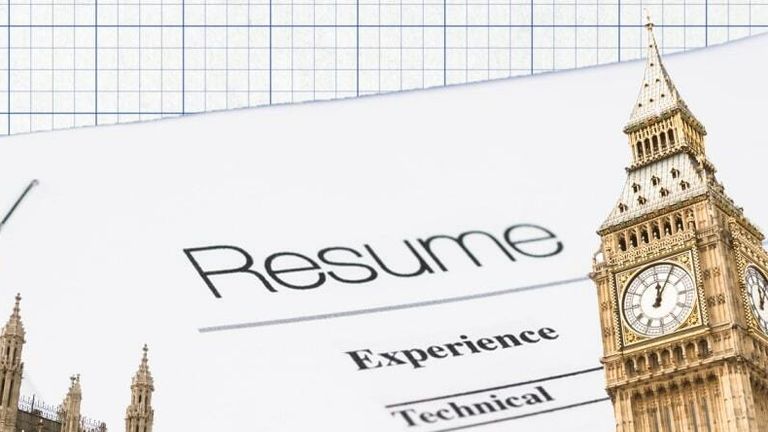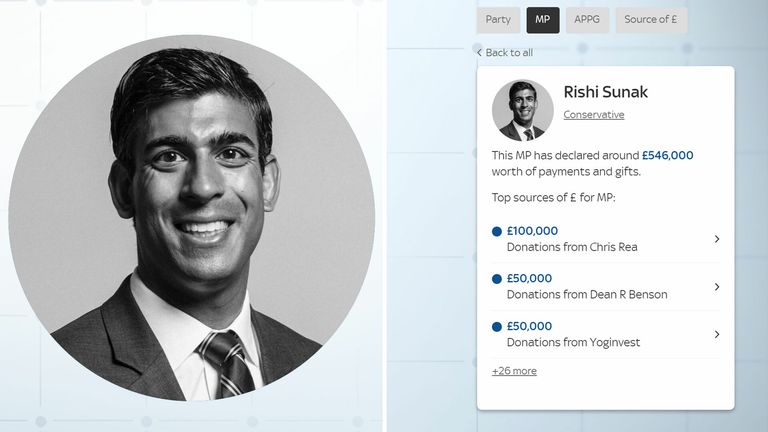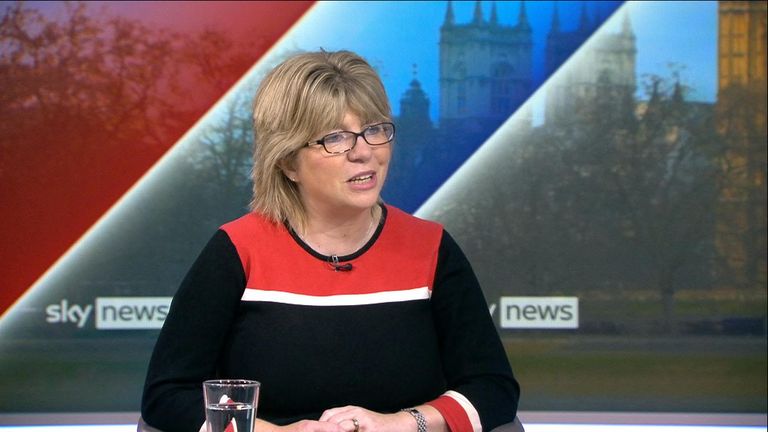Thirty-eight MPs have taken on second jobs where the ultimate party paying them is unclear, according to Sky News’ analysis of the MPs’ Register of Financial Interests.
The jobs mainly involve MPs being paid through a broker – a consultancy business, a communications firm, or a speakers’ bureau – while not declaring the clients they are working for.
It casts doubt on the systems which are supposed to ensure transparency around MPs’ earnings.
The analysis was conducted as part of the Westminster Accounts – a Sky News and Tortoise Media project that aims to shine a light on money in UK politics.
But this light has made the remaining shadows all the more stark.
Read more:
Search for your MP
Why the Westminster Accounts matter
Ex-cabinet minister Sir John Whittingdale provides one of the clearest examples of these cases, but two current ministers – Andrew Mitchell and Johnny Mercer – also appear to fall into this category. Some MPs told Sky News they had signed contracts restricting them from being transparent about the clients they’d worked with.
It begs the question of who is really influencing UK politicians, with Transparency International saying the findings could suggest there’s a “culture of opacity” among some MPs.
MPs are supposed to give details about their non-parliamentary earnings in the Register of Members’ Financial Interests.
On the face of it, that is what Sir John has done.
He’s a former culture secretary and a long-serving MP with a wealth of political experience. He’s been offering his insight from him, as MPs are entitled to do, via a company called AlphaSights, which connects experts like him with his clients.
But it remains unknown who the clients Sir John spoke to are.
He’s reported in his public filings that he’s received more than £10,500 from AlphaSights to tap into his expertise across 17 different engagements.
He was quizzed earlier this year on two of these dealings by the Advisory Committee on Business Appointments (ACOBA), the watchdog overseeing ex-ministers’ jobs, after he failed to seek approval for this work from the committee.
He was deemed not to have broken any rules, however, as he told the chair of ACOBA that he had no long-term relationship with AlphaSights and they were separate “one-off” speeches he delivered. Prior approval is not necessary for one-off speeches.
However, this seems hard to reconcile with the fact that Sir John has had 15 other engagements with AlphaSights since 2017, as the Westminster Accounts help reveal. And an ex-AlphaSights employee has told Sky News that rather than “speeches”, the work typically involves attending a meeting or having a call with two or three people from the client company.
These clients, who pay a fee for the privilege, are usually investment firms and consultancies looking for insight from experts to help make business decisions.
Sir John did not respond to questions from Sky News regarding who these clients were.
Read more:
Westminster Accounts: Following the money
How to explore the database for yourself
It is a clear example where the companies paying to contract an MP’s services, and the company reported publicly in the Register of Interests – AlphaSights in this case – differ.
Sir John’s case is just one of many where these questions apply.
Defense minister Mr Mercer, for example, declared payments of £3,600 and £1,110 in 2021 for two speaking engagements from Chartwell Speakers, a speaker agency.
No details are given in the register as to whom the clients acting through the agency were, as MPs are usually expected to report in these instances.
Beyond speeches and individual engagements, there is a wider group of 11 MPs who are on the books of communications or political consultancies who often don’t give details about the clients they work with.
International development minister Mr Mitchell, for example, had been working as an advisor to Montrose Associates until last October, when he returned to government as a minister.
Montrose Associates is a strategic consultancy which, according to its website, draws on “access to privileged networks of decision-makers” when advising its clients.
Mr Mitchell received more than £340,000 for around 75 days of work since taking up the role in 2013. Exactly which clients he worked with and what he did cannot be known from the cursory description of his work given in the Register of Interests.
This lack of transparency creates particular problems for holding ex-ministers to account. They often undertake new roles on the condition they refrain from lobbying government on behalf of clients of their employers.
Tracey Crouch, another former minister, received approval from ACOBA to become a senior adviser to communications firm The Playbook between February 2018 and March 2020. Her role was to advise some of The Playbook’s clients in the technology and energy sector.
But who these clients were has not been reported in the public record. This was despite ACOBA advising Ms Crouch she couldn’t lobby on behalf of The Playbook’s clients for two years after leaving government.
There is no suggestion Ms Crouch – or any other MP – has broken lobbying rules. But Steve Goodrich, head of research and investigations at Transparency International UK, has cast doubt on the systems designed to ensure politicians aren’t being unduly influenced.
“ACOBA is a paper tiger – it has no teeth, no ability to enforce the advice that it gives,” he said.
“And there’s a broader question about whether these omissions reflect a wider culture of opacity within parliament, at least among some members, that needs challenging. That’s more of a cultural issue, which may be harder to shift.”
There is also another group of MPs who have financial interests that may not be apparent from public disclosures.
Ten MPs have had employment with investment or private equity funds where there is a reasonable expectation they will be advising or making investment decisions about firms within the portfolios of these parent companies.
Yet the current rules – or the enforcement around them – put little onus on MPs to report these details.
David Davis, for example, the former Brexit secretary, sits on the advisory board of THI Holdings GmbH, an investment firm that declares holdings in seven companies on its website.
One of these companies is Oxford International Education Group – where Conservative MP Chris Skidmore sits on the advisory board. Were Mr Skidmore to speak in parliament on higher education issues, he would be expected to draw attention to his financial interest in this area.
But from what Mr Davis has disclosed, it is far more difficult to understand how ACOBA’s advice – which stated that Mr Davis should not lobby on behalf of THI’s subsidiaries in the two years after leaving government in 2019 – could be easily enforced.
Mr Davis is far from alone in working for one of these firms. Andrew Mitchell, Jonathan Djanogly, Richard Fuller, Bim Afolami, Alun Cairns and Stephen McPartland have all had positions with boutique investment firms in the past three years. There is no suggestion these MPs have broken any rules.
A spokesperson for Mr Mitchell told Sky News that all his outside business interests have always been properly registered in the normal way. Mr Mercer, Ms Crouch, and Mr Davis did not respond when asked for comment.
MPs more likely to ask questions in parliament after taking up jobs in finance
Recent research from Dr Simon Weschle, author of Money In Politics, shows that MPs in certain types of second jobs behave differently.
He found that MPs were more likely to ask questions in parliament after taking up jobs in finance or the legal profession.
Dr Weschle said the lack of detail disclosed around these jobs makes it difficult to know if this amounts to lobbying, which would break the rules.
He said: “They could be asking more questions for a number of other reasons or for a reason directly relating to their work… but because we don’t know who they’re advising, who they have holdings in – who they’ re ultimately working for – it’s really hard to make that connection.”
One reason MPs may not disclose further details is if doing so may conflict with professional practices.
Ten current MPs, for example, have worked as lawyers and accountants this parliament without naming their clients. Some may feel it inappropriate to disclose the firms or individuals contracting their services.
Click to subscribe to the Sky News Daily wherever you get your podcasts
Labor leader Sir Keir Starmer, for instance, is one MP who has reported payments for giving legal advice with little detail offered as to the source of these funds. Sir Geoffrey Cox, who has earned more than £2m in legal fees this parliament, is another who provides details of the chambers who pay him, but rarely his clients.
Sky News understands there are no professional standards rules in the legal or accounting profession that would stop MPs disclosing their clients, unless they expressly requested anonymity.
Some MPs involved in business consulting have told Sky News they have signed contracts that prevent them from naming clients publicly.
Yet if these obligations are sometimes the reason for a lack of disclosure, it calls into question the rules which at times seem to put MPs’ private interests above the transparency of the system. In some places, like the US, this problem has been solved by banning politicians from having second jobs.
Dr Weschle thinks there’s room for reform in the UK: “It seems to be that second jobs clearly undermine the public’s trust in politicians… so we should think about whether certain kinds of jobs should be more restricted, or whether MPs should be made to be more transparent about what they’re doing.”
Additional reporting: Ganesh Rao



